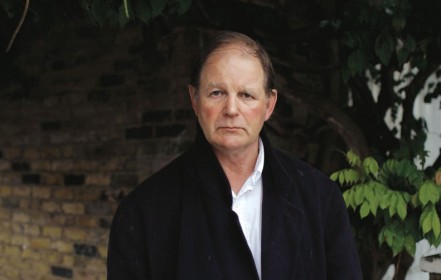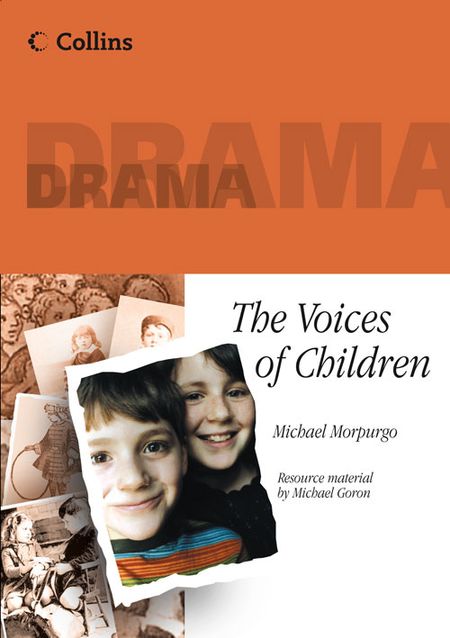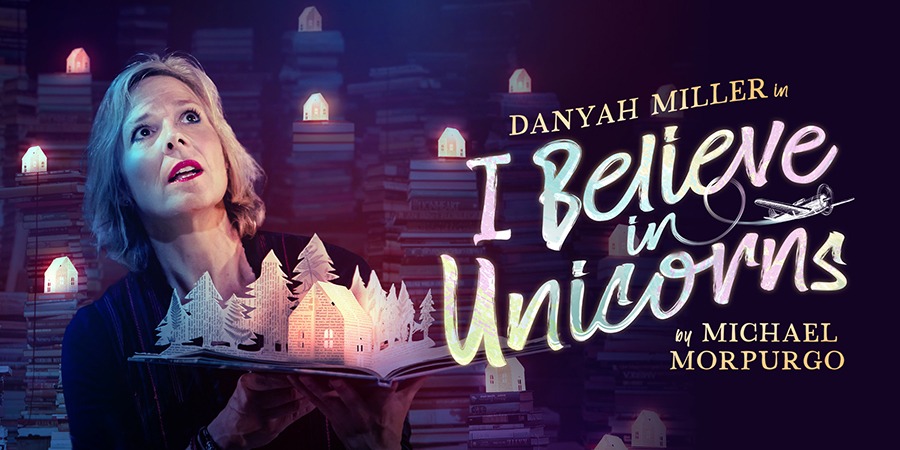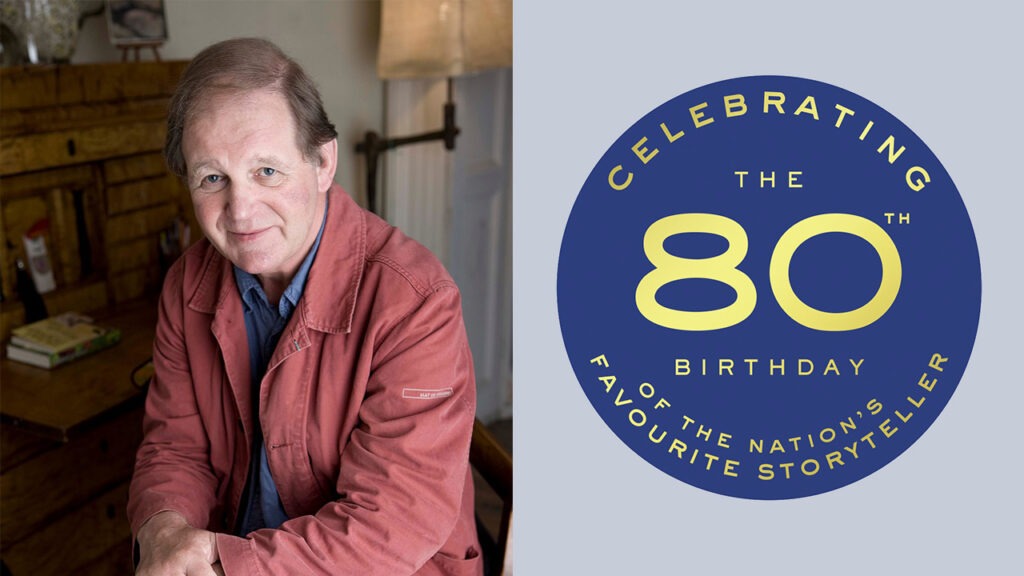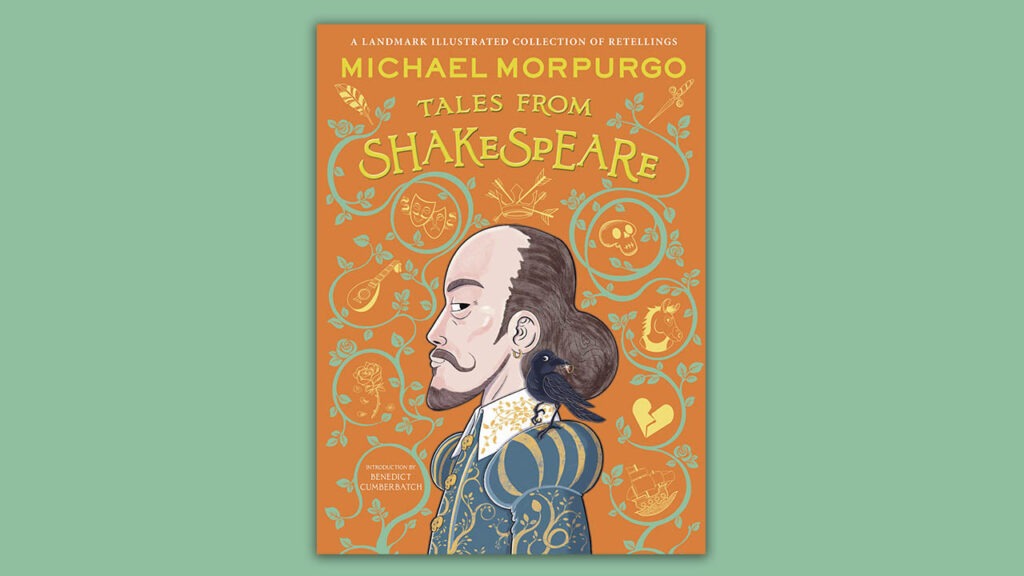Never have a man and a pub been so perfectly aligned. Michael Morpurgo arrives with his wife, Clare, at the Duke of York in Iddesleigh, as rumpled and friendly as the ancient room with its low ceilings, dark beams and thick stone walls. When I thank him for coming to meet me, he says: “Thank you for coming all this way?” (They have walked, on this damp day, up the lane from their house, while I have criss-crossed England in trains and taxis to a village buried in Devon.) “I think you’re mad,” he smiles, “but there we are.”
We squeeze round a wooden table and eat shepherd’s pie. Morpurgo, his hair awry, cheeks rosy and wearing a red, woolly jumper that at times makes it hard to suppress the urge to hug him, drinks ale. Nearby, there’s an open fire with two chairs positioned on either side, as if in conversation. It was here, years ago, that Morpurgo talked to an old man, a First World War veteran, who told him of the friendship he formed with his horse during the war. That conversation gave Morpurgo the idea for a book, War Horse, which, 25 years later, became a hit West End play and will soon beam into cinemas the world over as a Steven Spielberg film.
The original version, a slim volume published in 1982, quickly became popular with children, like so many of Morpurgo’s books. He rarely dabbles in wizardry or fantasy: most of his stories are about real people and places, weaving in and out of war and life, suffused with melancholy. The night before coming to Devon, I went to see War Horse at the New London Theatre on Drury Lane, where the stage adaptation has played to full houses since it transferred from the National Theatre in 2009. At the end, after two hours of watching horses brought miraculously to life by puppeteers, I was damp-eyed and embarrassed, only to see, when the lights came up, that nearly everyone else in the audience had crumpled into tears.
In New York, where the play transferred in March this year, it was reported that a woman passed out from emotion during a performance. No wonder Kathleen Kennedy, Spielberg’s fellow producer, suggested that he make the film, which will be released in the UK in January.
It is perfect for Spielberg: fresh-faced soldiers, an innocent animal, great rushes of emotion, plus a $90m budget and the sweeping strings of a John Williams score. When Spielberg came over to shoot scenes on Dartmoor, Morpurgo and his wife were invited on-set. He describes, eyes alight, watching a scene with the actors Benedict Cumberbatch and Tom Hiddleston playing army officers, poring over a battle plan. Spielberg filmed take after take, altering an arm here, an expression there, the actors responding to his every direction, and turned to Morpurgo after the tenth attempt to whisper: “They’re just like Ferraris.”
The film feels like a Christmas present, he says – one he desperately wants to open but isn’t allowed to yet. If that sounds almost childlike, so does the quality of his anticipation: “I know I’ve built up my hopes considerably . . . I want it to live on and on in people’s minds.”
To emerge in your late sixties out of “deep obscurity” into the full glare of a global publicity machine is strange, he knows, yet he can’t resist the thrill. “I find it very exciting. It’s very heady to be involved with other people remaking your story.” His fellow children’s author Michael Rosen tells me on the phone that Morpurgo, who has written more than 120 books for children, is probably “just thinking: ‘Finally!’ It’s not that he hasn’t had success; it’s just that he would have seen the Harry Potters and the Philip Pullmans getting to Hollywood and he might have scratched his head.”
Late success somehow fits the story of Morpurgo’s life. It took him a long time to become a writer – a struggle of identity as much as the challenge of putting words on a page. He was born in 1943 and grew up in London, where his childhood was shaped by war – he played at bomb sites, watched his mother weep over a photograph of his uncle Peter, who had been killed in 1914, and saw his family fall apart after the Second World War.
His father, “a bit of a dandy” who had been an actor, joined the Royal Pioneer Corps and was away for years. His mother met someone else, a major in the Royal Artillery, and at the end of the war his parents divorced and his mother remarried. This second marriage – to an old-fashioned military man – had a deep effect on Morpurgo. “The influence of my stepfather is quite strong . . . I think he felt, ‘This is the way a boy should be brought up.’”
So Morpurgo was sent away to board at the King’s School in Canterbury and did what “all good public school boys should do” – joined the rugby team, became school captain and generally put on a display of bullish cheer. When told that he wasn’t academically adept enough to go to university, he decided to follow his stepfather and join the army. But at Sandhurst, Morpurgo had “a kind of Damascus moment” while out on an exercise in the freezing winter of 1962. After the cadets had dug trenches and been screamed at by officers, night fell and the grim scene transformed into something beautiful. “Between our trenches, there was this wonderful expanse of snow and trees,” he remembers, “and it reminded me of the night of the Christmas truce in 1914, when the armies came together and played football. And what they did was the right thing – they came together and tried to make a peace.”
The army seemed to go against everything he believed in or thought mattered. So he quit. “Everyone was very disappointed and quite angry, including people in my family. I was letting everyone down. I wasn’t living up to what everyone had hoped for me.”
Forty years on, a grandfather-of-six and former children’s laureate, sitting contentedly in his local pub, he still looks pained at the memory. For all his subsequent success, the sense that he hasn’t lived up to his potential, that he has disappointed people, bothers him. After the army he went to university and then became a primary school teacher. A sense of failure followed him. At one point in our conversation, he rails against Michael Gove’s proposed school reforms but is most perturbed by Gove’s desire to withhold teacher-training funding from those with a Third, Morpurgo’s grade in English and French from King’s College London.
Teaching, good teaching, he believes, has nothing to do with exams or results or rankings. It has to do with the ability of a teacher to talk to a child, to set imaginations free. He believes this with the conviction of one who was deprived – the creativity was almost stifled out of him as a child. “In the 1950s, when you did writing, any kind of writing, it was prescriptive,” he says. “You wrote about one subject, which was dictated to you by a teacher; it was up there on the board and you wrote about it. You had a limited amount of time to do it and if you didn’t do it well, there was often a punishment – a detention, or whatever – to follow. So the whole business of facing a blank page, when I was little, I found enormously frightening, because I wasn’t any good at it.”
Storytelling came to him the old-fashioned way: he would stand up in front of a class of rowdy children and settle them down with a story made up on the hoof. Morpurgo realised that if he could tell it, he could probably write it down, too. Slowly, slowly, he began. As Rosen says, “stories saved him” and helped him find “a whole other way of being in the world. He could approach the world in a much more caring way.” Yet writing was never easy and it still isn’t now. “I never begin a book thinking I can even start it, let alone finish it,” he says. “It’s a very trembly thing.”
Fairy tale of New York
Morpurgo often talks like this – open, confessional, spilling out his insecurities and uncertainties, confiding how they still haunt him.
He freely admits that he would never have become a writer without the encouragement of two people – his wife and the poet Ted Hughes. Morpurgo remembers first meeting Hughes as you might in a dream – he was walking along the River Torridge at dusk when he saw a figure looming up from the bank.
“He was a very impressive man anyway, and in waders and boots and a hat he was huge,” he recalls. The two men talked – Morpurgo, like an eager fan, only too aware of Hughes’s identity, knowing that the poet lived nearby. They bonded at first not over writing, however, but Farms for City Children, the organisation that the Morpurgos had started in 1976, which brings deprived children to their farm to spend time feeding chickens and milking cows.
Hughes loved the idea – a result, Morpurgo thinks, of his childhood wandering the Yorkshire moors. “He felt that it was the right of every child, and our responsibility to enable children, to be part of this living world.” He became the charity’s first president, helped the couple to fundraise and would come up to the farm in the evenings to read to the children by the fire as they drank cocoa.
They talked about writing, too. Hughes knew that Morpurgo was trying to become a writer, with little success, and encouraged him. Morpurgo’s touchstone was a book that Hughes wrote called Poetry in the Making. “Whenever I felt low and depressed about writing, I’d go back to it, because, really, what it’s saying is that everyone can do this, we’re all storytellers, and if you listen to your feelings and you listen to the words inside, and you listen to the words out loud, you can make poetry, you can make stories.” (In an email to me, the author Philip Pullman refutes the idea of a “born storyteller”. “We who are storytellers know what a silly expression that is,” Pullman writes. “You work to become a storyteller. You work at it for years, you study every aspect of this demanding art, you stay up late, you work all round the clock, you think deeply and fully and strenuously . . . Michael is a made storyteller and I salute and admire him for it.”)
Perhaps Hughes’s greatest act of friendship was his reaction to Morpurgo’s disappointment after not winning a Whitbread Book Award in 1982 for War Horse. Morpurgo spent the next day with Hughes, fishing and touring antiques shops. (“He loved pottering days,” he says of Huges, “he loved to potter round with his friends and have tea.” Hughes didn’t mention the prize until the afternoon, when they were sitting in a café and he leaned forward and told Morpurgo that prizes were nothing to do with his life as a writer. “He looked me straight in the eye and said, ‘You’ve written a fine book,’ and his exact words were, ‘You’ll write a finer one.’ You don’t forget stuff like that.” Hughes helped him believe that he was good and gave him the resolve to keep going. “All writers need that at a certain point, if you haven’t got it yourself: the drive and momentum, the self-confidence.”
The other person who kept him going, and still does, is Clare. They share all the codes and quiet jokes of a long marriage – he mocks her for exaggerating, she chides him for getting carried away – but to be in their company is to be aware of a palpable, lifelong bond. Morpurgo’s biographer, Maggie Fergusson, tells me that it’s the closest of marriages: “I’ve never ever come across anything quite like it.” They share a childlike glee, too, talking over each other as they tell me about a trip to New York to see War Horse and, after the show, walking down Broadway late at night – “I thought, this is out of a movie!” Morpurgo says.
A few weeks after our lunch, Morpurgo and I talk again on the phone and, at the mention of his wife’s name, he says, “You get lucky, don’t you?” They met in Greece, both on holiday, when he was 18, she 19. They sat on a beach and talked and, as she says simply, “It was one of those things.” She was the first to coax him out of his unhappy military life. Clare’s father was Allen Lane, the publisher, and she wanted to use her inherited wealth to help others.
Together, they concocted the idea of Farms for City Children. More than anything, Clare bolstered Morpurgo’s wavering sense of self. “I think it’s been a marriage of two souls,” he says. “I certainly would never have written a book without her. She was the one who first encouraged me to tell a story down on to paper. It gave me the confidence to begin.”
In this strange moment, of Hollywood and late glory, of Tony Awards (War Horse won five this year) and Spielberg encounters, she also helps to keep him in touch with reality. “I want to fly,” Morpurgo says, “but she’s got the noose around my hands, dragging me back, saying, ‘Excuse me, excuse me . . .’ She’s not heady. She loves it . . . but she also despises any kind of celebrity. I think she finds it deeply wicked, actually, because somehow it’s this thrusting of one’s self-awe. You’ve got to tell everyone how good you are and if anything smacks of that at all, she finds it something to steer well clear of and that’s something good for me to have around. She slaps my wrists.”
His biographer, Fergusson, puts it another way. While Michael needs “some sort of big excitement” in life, Clare is happy to spend her days in her garden, watching her roses and tomatoes grow.
True believer
When you meet an author you loved as a child, it is hard not to feel small again, especially as Morpurgo is like a personification of his literary style: warm, sensitive, worried. He is a champion of the shy child, the awkward one in the corner. He knows what it’s like to be that child. He knows what it’s like to be that adult. Perhaps this is why he has such a hold on the children he meets. All his friends I speak to say the same thing: he can silence a room not only with his stories but also with his honesty. Rosen, who has given countless readings with Morpurgo, says it is because what he says comes “from a real sense of belief”. In a culture, Rosen argues, that “reduces and diminishes” children, Morpurgo “writes from a perspective that says, ‘Take children’s emotional lives seriously’”.
Morpurgo acts on this seriousness. He has travelled to Gaza with Save the Children to write about the situation for children there, given BBC lectures on children’s rights and spoken at countless schools and festivals. He is enraged by inequality in Britain, by the government’s neglect of the kind of children who visit the farm, “who have very little, have very low expectations, have a low input of enrichment into their lives”.
The riots in August, he thinks, were a result of a generation of young people feeling entirely excluded from society. “It’s no good David Cameron standing up and saying, ‘We’re all in this together’ – then people see that bankers’ bonuses are millions of pounds.” He bemoans a culture in which “greed and celebrity and selfishness are seen to dominate” and our politicians appear to lack ideals.
To be idealistic, Morpurgo knows, is “a hopelessly impractical thing”, but it is also what makes him the writer that he is. His books are gentle, free from cynicism, almost naive in their hope for a world where good will out. Pullman, who writes to me late one night after having dinner with Morpurgo, says that he admires his friend not just for his writing but for his energy, devoted to making the world a better place for children. “He’s a good man.” In Morpurgo’s presence, Pullman writes, he feels “charged, recharged . . . filled with . . . Well, glee is one word for it. Delight. Michael is like that. Laughter comes into it a lot.”
After an afternoon in Iddesleigh, I know what he means. Morpurgo propels us through lunch with verve and enthusiasm for every topic of conversation, digressing with excitable ease.
At the end, Clare insists that he take me to the village hall he writes about in War Horse. He wheels around the building, relating its history and pointing out local characters in the old black-and-white photographs on the walls.
I wonder, when we speak later on, if he is worried about his peaceful corner of Devon being turned into a theme park once the film comes out – busloads of tourists coming to track down the place where the War Horse story was first told. He seems relaxed: “It’s a very separate and different place from the rest of the world . . . I’m living in the same deep lanes that people have lived in for a thousand years.” Anyway, he adds, “Busloads couldn’t get here, because the lanes are too narrow.” He knows, too, that the Hollywood machine, with all its fuss and bluster, boils down to the simplest of things: “It’s just a story, that’s all it was. The story is no greater than it was.”
Published 17 November 2011 by New Statesman
